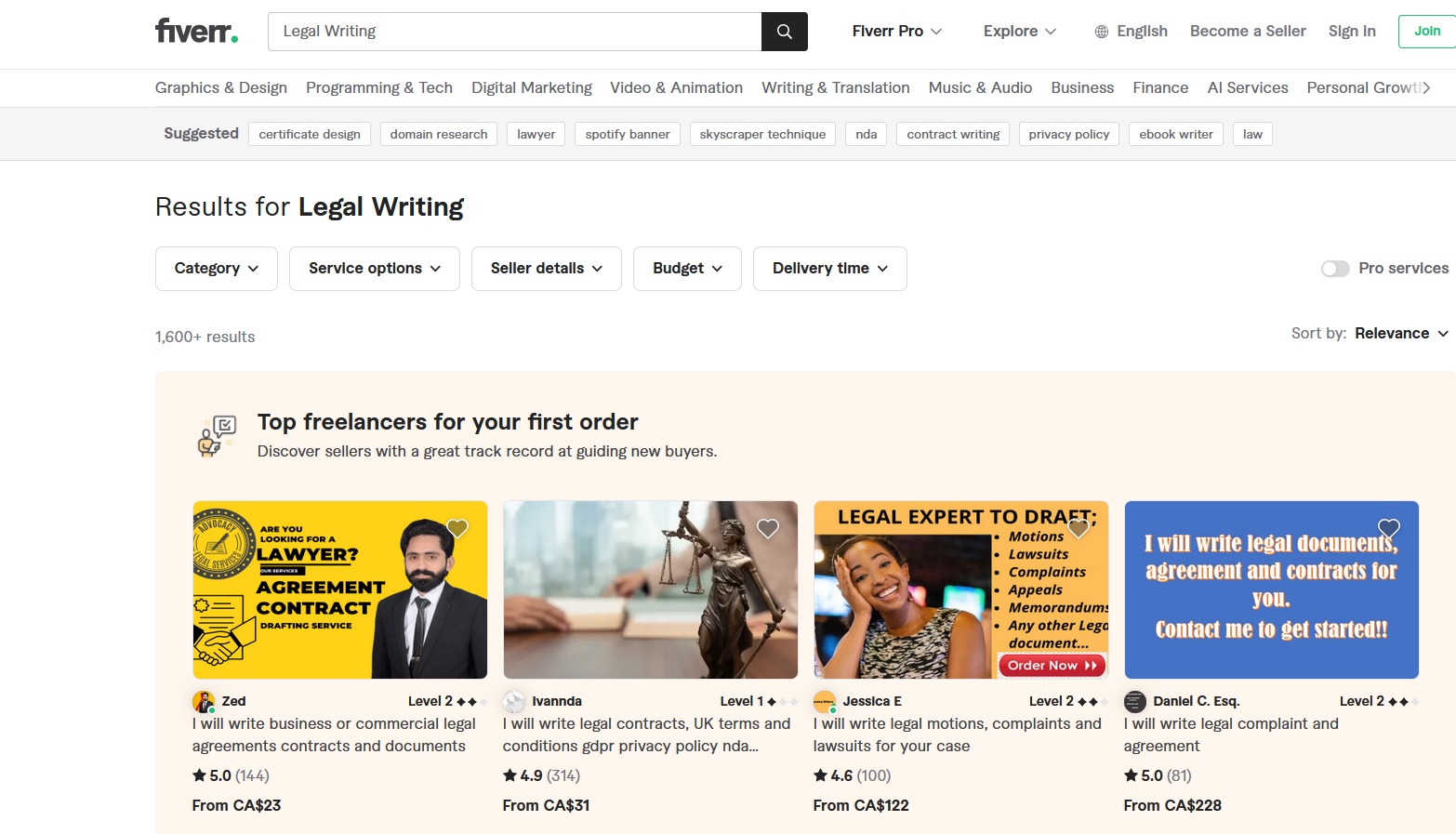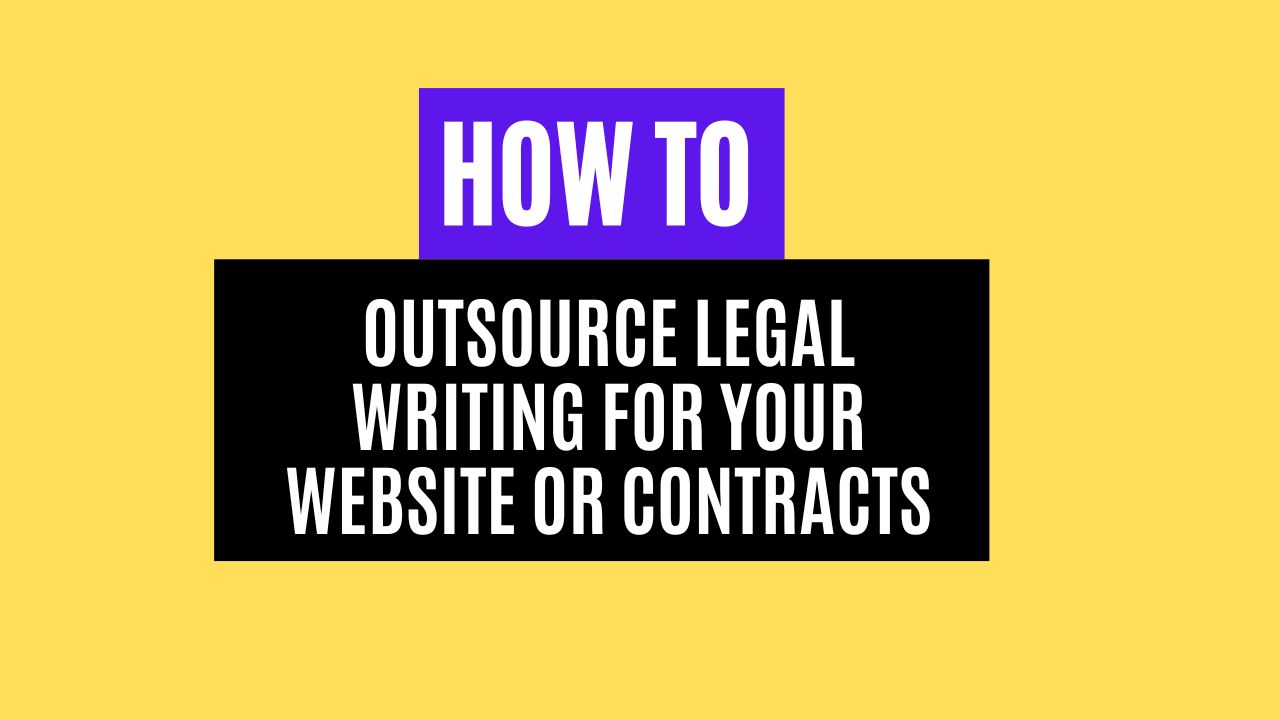Legal writing can be complex, time-consuming, and tricky to get right. Whether you’re working on a website’s terms of service, a privacy policy, or a contract for a business deal, the importance of clear, legally sound documents cannot be overstated.
But, let’s face it: not everyone has the time, expertise, or interest in drafting these kinds of documents themselves. The good news? You don’t have to do it all yourself. You can outsource legal writing for your website or contracts and still maintain a professional, legally compliant presence.
In this post, we’re going to walk you through how to outsource your legal writing tasks effectively, including where to find the right professionals and how to work with them.
So sit back, relax, and let’s get your legal documents sorted out without the headache.
1. Understand What You Need Before Hiring

Before you dive into outsourcing, it’s essential to understand the exact legal documents you need. This might sound obvious, but some people make the mistake of hiring help without being clear about what they’re asking for.
Legal writing can include:
- Website Terms of Service: These are the rules and guidelines users must agree to when using your website. It covers things like how users should behave, your rights, and how disputes will be handled.
- Privacy Policy: This is a legal requirement for most websites. It outlines how you collect, use, and protect visitors’ personal information.
- Contracts: Whether it’s an employment contract, a service agreement, or a partnership deal, these are vital for protecting your business and ensuring everyone is on the same page.
Knowing exactly what you need (and why) will help you find the right person for the job. This can also help you avoid unnecessary costs by not asking for more than what you need.
2. Why Outsourcing Is the Smart Move
You may be thinking, “Why not just write it myself?” While it’s possible to write basic legal documents with some online templates, there are significant risks involved.
Legal documents must be tailored to your specific business, and one mistake could leave you exposed to legal trouble down the line.
Outsourcing your legal writing gives you several benefits:
- Expertise: A professional legal writer knows the ins and outs of the law. They can draft documents that are clear, compliant, and legally sound.
- Time-Saving: Writing legal content takes time. Outsourcing frees you up to focus on what you do best – running your business.
- Cost-Effective: Hiring an experienced freelancer can be far cheaper than hiring a full-time lawyer or using expensive services.
And, let’s not forget, legal documents often need to be updated as regulations change. Having someone you can rely on to make those updates ensures your website and contracts stay current.
3. Where to Find Legal Writers
Once you know what documents you need, the next step is finding the right person to help.
There are a number of places where you can find professional legal writers, but one platform that stands out is the Fiverr Platforum. Fiverr connects businesses with freelancers offering a variety of services, including legal writing.
What’s great about Fiverr is that you can find a wide range of options based on your budget. Whether you’re looking for someone to create basic website terms or need a more complex contract written, there are professionals ready to help.

And with Fiverr, you can read reviews, check past work, and directly communicate with the writer to make sure they understand your needs.
Fiverr gives you access to professionals at a variety of price points, which means you can find someone who matches both your budget and expertise requirements. It’s an excellent way to get high-quality legal writing without paying top dollar for a lawyer.
Plus, many Fiverr freelancers can quickly turn around work, so you won’t have to wait weeks to get your documents done.
4. Vetting the Right Legal Writer for Your Needs
Once you’ve found a platform like Fiverr to hire from, it’s crucial to vet your options to ensure you’re hiring the right person. Here’s how to evaluate the quality of a potential hire:
- Experience: Look for writers who specialize in legal writing, particularly those with experience writing the kind of documents you need. A writer who has done terms of service for other eCommerce websites, for example, will be well-suited to handle your needs.
- Reviews and Ratings: Take the time to read reviews and ratings left by previous clients. Look for consistent positive feedback, especially in the area you need assistance with.
- Samples of Work: Check if the freelancer has a portfolio or sample work available. This will give you a feel for their writing style and attention to detail.
- Legal Knowledge: Make sure the freelancer is knowledgeable in the area of law your documents pertain to. This is especially important if you’re looking for more complex contracts that require a high level of legal expertise.
- Communication Skills: The best way to avoid misunderstandings is through clear communication. Reach out to the freelancer with any questions you may have before hiring them. Pay attention to how responsive and professional they are.
5. Set Clear Expectations
Clear communication is critical to getting the results you want. Once you’ve found the right writer, outline exactly what you need from them. This includes:
- Scope of Work: What are you expecting? Are you looking for a complete set of documents or just one specific piece?
- Timeline: Set clear deadlines for when you need the work completed. If you need the documents urgently, make sure to mention that upfront.
- Budget: Have a clear budget in mind and communicate it with your writer. Make sure both of you are on the same page regarding fees, payment structure, and any potential additional costs.
- Revisions: Understand how many rounds of revisions are included in the price. Some writers may charge extra for additional changes, so it’s good to clarify this upfront.
Being transparent and organized about your expectations will help ensure the project goes smoothly and that you end up with high-quality legal documents that meet your needs.
6. Working with a Legal Writer on Fiverr
Once you’ve hired a legal writer, it’s time to get to work. Here are a few tips for working effectively with your writer:
- Provide as Much Information as Possible: Be sure to provide all the details they need to write accurate documents. This includes specifics about your business, any applicable laws or regulations, and examples of other documents you might like.
- Ask Questions: If you’re unsure about anything, don’t hesitate to ask. Whether it’s about a legal term, wording choice, or any section of the document, your writer will be happy to clarify.
- Give Feedback: After receiving the first draft, provide clear and constructive feedback. If something doesn’t sound right or is missing, let the writer know. They should be open to making revisions and improving the document to fit your needs.
- Request a Final Review: Before finalizing the documents, ask the writer to do a thorough review to ensure that everything is legally sound and clear. This extra step can save you headaches down the road.
7. Ensure the Documents Are Legally Compliant
While a freelancer can certainly help with the writing, it’s still important to ensure that the documents meet legal requirements.
For certain types of contracts, it may be worth having a legal professional review the final drafts to make sure everything complies with the law.
In some cases, your legal writer might have an understanding of the required compliance, especially if they’ve written for similar businesses in the past.
But, for peace of mind, it’s always a good idea to have a lawyer take a quick look, particularly if you’re operating in a regulated industry.
8. Make Sure the Tone Matches Your Brand
A good legal document isn’t just about legality—it’s about presenting your business in the right light. The tone and language of your legal documents should align with your brand’s voice.
For example, if your brand is casual and friendly, you don’t want your terms of service to sound too stiff or formal.
Similarly, if you run a high-end luxury business, your legal writing should convey that level of professionalism. Be sure to let your writer know your preferred tone when discussing the project.
9. Make Updates as Necessary
Legal requirements and regulations change, and your business may evolve as well. That’s why it’s important to update your legal documents periodically. As your business grows and changes, your contracts and terms may need to be adjusted.
Work with your writer to make any necessary updates and revisions to keep your documents fresh and compliant. Depending on the type of contract or document, you may need to revisit it annually or as your business introduces new services or features.
10. Keep Everything Organized
Once the legal writing is done, keep all of your documents organized and easily accessible. Store your terms of service, privacy policies, and contracts in a safe, digital location where you can quickly access them if needed.
If you ever need to refer to a particular contract or update your website’s legal pages, you’ll be glad you’ve kept everything in order.
Conclusion
Outsourcing legal writing doesn’t have to be difficult or expensive. With platforms like Fiverr, you can find skilled professionals who can draft high-quality, legally sound documents for your website and contracts.
By understanding your needs, setting clear expectations, and working closely with a legal writer, you can ensure your documents are both compliant and effective.
So, if you’re ready to focus on growing your business while leaving the legal writing to the pros, give outsourcing a try – you’ll be glad you did!

